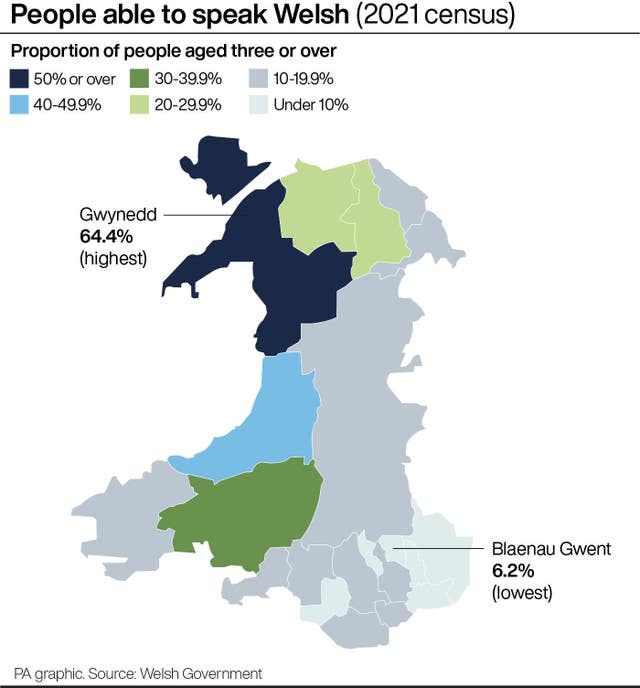Fewer people speaking Welsh than 10 years ago, Census reveals
The number of Welsh speakers has fallen in the past decade as fewer children are speaking the language, new figures show.
In 2021 an estimated 538,000 people in Wales aged three years and over (17.8%) reported being able to speak Welsh.
That is a decrease since 2011 when 562,000 or 19% spoke the language, according to the Office for National Statistics (ONS).
The ONS said one of the main factors contributing to the overall decrease is fewer Welsh speakers aged three to 15.
The data was collected by asking people to assess their own ability to understand spoken Welsh, and to speak, read and write Welsh.
In 2016 the Welsh Government set a target to have one million speakers in Wales by 2050.
Opposition politicians described the new data as “deeply disappointing” and said the Welsh Government had got further behind in meeting the language target.

Samuel Kurtz, Welsh Conservative shadow minister for the Welsh language, said: “This is a deeply disappointing statistic that shows the Labour Government is further off meeting its Cymraeg 2050 ambition than it was when it set the target of reaching a million speakers in 30 years’ time.
“What lies behind this? Self-reporting is a flawed model of measurement, and with such a long-term strategy, with responsibility being handed from minister to minister as we approach 2050, there is little accountability around decisions impacting the language.
“While we fully support the ambitions of the Cymraeg 2050 target, the Census’ data shows the stark reality of a tired Government, in power for too long and out of ideas.
“Positivity around the language, showing that it is cool, modern and useable in day-to-day life is that way we can ensure the most beautiful language on Earth can flourish in its homeland.”
Delyth Jewell, chair of the Senedd culture, communications, Welsh language, sport and international relations committee, said: “Today’s announcement is without doubt disappointing.
“The data confirms that it will take a long time and sustained support to reverse decades of decreases in the number of Welsh speakers. It shows the true urgency of need to stop this decline.
“The great Welsh historian Raymond Williams once said, ‘To be truly radical is to make hope possible rather than despair convincing.’
“The Welsh Government must now be truly radical in its goal of achieving a million Welsh speakers. A goal that is shared by all parties.
“This means being clear and robust of what is expected of us all in Wales and putting in place increased levels of funding and resource to meet the challenge.
“Without it, it is hard to see how we will achieve the shared aim by 2050.”
Welsh Lib Dem leader Jane Dodds called for action to halt depopulation to preserve language use.
“Although there is a multitude of factors behind the decrease, one thing is clear the depopulation of traditional rural heartlands of the language like Ceredigion, Ynys Môn, Carmarthenshire and Gwynedd must be halted if we are to ensure that usage of the language continues in everyday usage,” she said.
“These counties are losing many of their young people who move to more urban areas for work and who often then have less opportunity to use their Welsh skills.
“Providing jobs and investment in rural Wales is essential for the long-term protection of the language.”
Jeremy Miles, minister for education and the Welsh language, said: “Today’s census figures are of course disappointing and not what we wanted to see.
“Census 2021 shows us one snapshot of what’s happened over the last 10 years. We’ll look at those results in detail alongside all the other statistics and research that’s available to us.
“I’ve often said that Welsh isn’t just something I speak, it’s something I feel, and I feel more and more people feel that the language belongs to them. The key is changing those feelings into language use.
“We’ll take time to examine the data carefully, in particular the figures relating to three to 15-year-olds.
“Covid-19 meant that 2021 was an extremely uncertain time, with many people concerned about their children’s Welsh language abilities, children were out of school, and it may be that we are seeing this concern reflected in the way they reported their children’s use of Welsh.
“The National Survey for Wales shows an increase in people saying they speak some Welsh.
“This contrasts with the census figures released today. This is also something we will look at carefully.
“We remain absolutely committed to our aim of a million Welsh speakers and doubling the number of us who use Welsh every day by 2050.”

 Yahoo Movies
Yahoo Movies 
